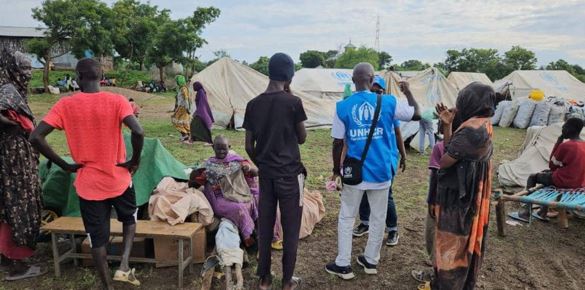Internally Displaced Persons (IDPs) in Western Equatoria State’s Ezo County have raised an alarm over their worsening humanitarian conditions, citing a lack of food, shelter, medical supplies, clean water, and educational services.
Problems commenced for most of the IDPs in February 2020 when violence broke out in Tambura County between armed groups affiliated with SPLM-IO and government forces. Renewed conflict in January 2023 caused another wave of displacement, forcing more families to flee from Tambura to Ezo County in search of safety. The majority of the IDPs are women, children, and elderly persons who left behind their homes, farms, and livelihoods.
Speaking to Radio Tamazuj, Patrick Kumbo Bangi, a church leader and IDP in Ezo, expressed frustration with the limited support they have received.
“We are suffering due to the absence of humanitarian aid. We lack basic shelter, medicines, and other essential needs. The assistance provided is insufficient and not consistent,” he lamented. “They gave each household only SSP 170,000, regardless of whether the family had 8 or 30 members. That amount cannot cover our basic needs.”
Kumbo explained that each household received only one tent and one blanket in January, which he described as grossly inadequate for large families. He also pointed to a lack of health services and access to education for their children.
“We have no health facilities nearby, no teachers, and not enough clean water in the camps,” Kumbo added.
Hellen Borowia, another displaced person who fled violence in Tambura, echoed similar concerns.
“We are lacking food, water, hygiene, and sanitation. The few items given to us were not enough to meet the needs of all IDPs,” she said. However, she commended the government for maintaining peace and security in the area, noting that they feel safe despite the hardship.
Meanwhile, James Rezaga highlighted the plight of pregnant women and children.
“Most of our children are not in school,” he stated. “Pregnant women receive no support for maternal health. We rely only on the main hospital in Ezo, which is too far from our camp.”
For his part, Siani Martin, the Relief and Rehabilitation Commission (RRC) Coordinator in Ezo County, acknowledged the challenges faced by the IDPs. He explained that many arrived late, which delayed the delivery of humanitarian aid.
According to Siani, around 7,000 IDPs are currently scattered across Ezo Central Payam, Yangiri, Nandi, Bagidi, and Bariguna. He confirmed that aid organizations such as the Norwegian Refugee Council (NRC) and Danish Refugee Council (DRC) had previously supported the displaced with food, cash, and basic items, but the needs far outweigh the support available.
“Shelter and food remain the most critical needs, followed by agricultural support—tools, seeds, and farming inputs—which are also lacking,” Siani said.
The IDPs are calling on humanitarian agencies, local authorities, and national government bodies to urgently intervene and improve their living conditions before the next rainy season worsens the crisis.




